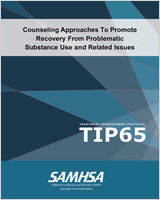This is an open-access report distributed under the terms of the Creative Commons Public Domain License. You can copy, modify, distribute and perform the work, even for commercial purposes, all without asking permission.
NCBI Bookshelf. A service of the National Library of Medicine, National Institutes of Health.
Contents
- Foreword
- Executive Summary
- TIP Development Participants
- Chapter 1—Introduction to Recovery From Problematic Substance Use
- What Is Recovery?
- Settings for Recovery-Oriented Counseling
- Scope of Practice for Providing Counseling
- Problematic Substance Use: Background and Evolving Explanations and Services for It
- Evolving Service Landscape and Workforce
- Recovery Goals for Problematic Substance Use
- Pathways of Recovery
- Recovery as a Continuum
- What Is Recurrence of Problematic Substance Use?
- Benefits of Promoting Recovery and Preventing Recurrences
- Introduction to Recovery-Oriented Systems of Care
- Introduction to Recovery Research: Current Topics and Needs
- Conclusion
- Chapter 2—Framework for Supporting Recovery With Counseling
- Chapter 3—Counseling Approaches for Promoting Harm Reduction and Preventing Recurrence
- Chapter 4—Counseling Approaches for Sustaining Recovery and Promoting a Healthy Life
- Chapter 5—Implementing Recovery-Oriented Counseling Programs
- What Is a Recovery-Oriented Counseling Program?
- Benefits of Adopting a Recovery Orientation
- Centering Clients in the Conversation
- Becoming a Recovery-Oriented Organization
- Inviting People Who Are Involved in Recovery to the Table
- Providing Person-Centered, Strengths-Based Counseling Services
- Developing Community Partnerships
- Recovery-Oriented Counseling Outside of Traditional Treatment Settings
- Developing Recovery-Oriented Policies and Procedures
- Engaging in Recovery-Oriented Workforce Development
- Conclusion
- Chapter 6—Resources
- General Resources
- Publications
- Mutual-Help Groups
- Online Boards and Chat Rooms
- Treatment Locators
- Advocacy Organizations and Resources
- Harm Reduction
- Health Equity
- Recovery-Oriented Systems of Care (ROSC)
- Counseling Approaches
- Psychoeducation
- Trauma-Informed Care
- Recovery Housing
- Employment Support
- Education
- Health and Wellness
- Digital Recovery Support Tools
- Telehealth
- Assessment and Screening
- Peer Support Services
- Funding
- References
This publication was prepared under contract number 283-17-4904 by the Knowledge Application Program (KAP) for the Center for Substance Abuse Treatment, Substance Abuse and Mental Health Services Administration (SAMHSA), U.S. Department of Health and Human Services (HHS). Suzanne Wise served as the Contracting Officer's Representative.
Suggested citation:
Substance Abuse and Mental Health Services Administration. Counseling Approaches To Promote Recovery From Problematic Substance Use and Related Issues. Treatment Improvement Protocol (TIP) Series 65. Publication No. PEP23-02-01-003. Rockville, MD: Substance Abuse and Mental Health Services Administration, 2023.
The views, opinions, and content expressed herein are the views of the consensus panel members and do not necessarily reflect the official position of SAMHSA or HHS. No official support of or endorsement by SAMHSA or HHS for these opinions or for the instruments or resources described is intended or should be inferred. The guidelines presented should not be considered substitutes for individualized client care and treatment decisions.
- NLM CatalogRelated NLM Catalog Entries
- Counseling Approaches To Promote Recovery From Problematic Substance Use and Rel...Counseling Approaches To Promote Recovery From Problematic Substance Use and Related Issues
- Continuity of Offender Treatment for Substance Use Disorders from Institution to...Continuity of Offender Treatment for Substance Use Disorders from Institution to Community
- Brief Interventions and Brief Therapies for Substance AbuseBrief Interventions and Brief Therapies for Substance Abuse
- Behavioral Health Services for People Who Are HomelessBehavioral Health Services for People Who Are Homeless
Your browsing activity is empty.
Activity recording is turned off.
See more...
